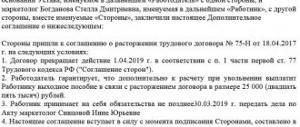Severance pay (Article 178 of the Labor Code of the Russian Federation)
Upon termination of an employment contract due to the liquidation of an organization (clause 1 of Article 81 of the Labor Code of the Russian Federation) or a reduction in the number or staff of the organization's employees (clause 2 of Article 81 of the Labor Code of the Russian Federation), the dismissed employee is paid severance pay in the amount of average monthly earnings.
When dismissing an employee on the specified grounds, with his written consent, the employer has the right to terminate the employment contract with him before the expiration of the notice of dismissal period, paying him additional compensation in the amount of average earnings, calculated in proportion to the time remaining before the expiration of the notice of dismissal period (Article 180 of the Labor Code RF).
The right to initiate earlier than specified in the notice of dismissal in connection with the liquidation of the organization (clause 1 of Art.
81 of the Labor Code of the Russian Federation) or a reduction in the number or staff of the organization’s employees (clause 2 of Art.
81 of the Labor Code of the Russian Federation) dismissal belongs to the employer. The employee has the right to agree with such an offer from the employer or refuse it.
The employee's consent must be expressed in writing.
The Labor Code of the Russian Federation also guarantees that the dismissed person will retain the average monthly salary for the period of employment, but not more than two months from the date of dismissal (including severance pay). The law states: “for the period of employment” means that the average monthly salary is retained for the former employee until the day of his employment at a new place of work.
For example, an employee got a job on the 20th day of the second month, which means he is entitled to payment for 19 days.
By decision of the employment service body, the average monthly salary is retained by the dismissed employee in exceptional cases and for the third month from the date of dismissal, provided that within two weeks after the dismissal the employee applied to this body and was not employed by it.
Lack of unity in judicial practice regarding the issue of preserving the average monthly salary for a dismissed pensioner during the third month on the basis of Part 2 of Art. 178 of the Labor Code of the Russian Federation, indicates that this issue is controversial and has not yet received an unambiguous resolution.
It should be noted that the issue of maintaining the average monthly salary for a dismissed employee who is an individual entrepreneur has also not been resolved either by law or by judicial practice.
These examples show the undesirability of regulating one issue by the norms of different branches of law - labor and social protection. It seems that the legislator should finally resolve issues of social protection within the framework of legislation on social protection of the population.
According to Art. 318 of the Labor Code of the Russian Federation for persons dismissed from organizations located in the regions of the Far North and equivalent areas due to the liquidation of the organization or reduction in the number or staff of employees, the average salary is maintained for the period of employment, but not more than six months (including a monthly day off benefits).
In accordance with paragraph 14 of the Resolution of the Council of Ministers of the RSFSR dated 02/04/1991 No. 76 “On some measures for the socio-economic development of the regions of the North”, workers released in connection with the reorganization, liquidation of associations, enterprises, organizations and institutions located not only in regions of the Far North and in areas equated to regions of the Far North, but also in areas and localities where bonuses are paid in the manner and on the terms determined by the resolution of the Central Committee of the CPSU, the Council of Ministers of the USSR and the All-Russian Central Council of Trade Unions dated 04/06/1972 No. 255, for the period of employment, but not more than six months, the average salary at the previous place of work is maintained at the expense of enterprises and organizations releasing workers.
Unlike Art. 318 of the Labor Code of the Russian Federation, which allows the preservation of average earnings for six months in cases of release of workers in connection with the liquidation of an organization or reduction of its staffing levels, in regions and localities where bonuses are paid in the manner and under the conditions determined by the resolution of the CPSU Central Committee, the Council of Ministers of the USSR and All-Union Central Council of Trade Unions dated 04/06/1972 No. 255, average earnings for the fourth to sixth months can only be retained by employees released in connection with the reorganization or liquidation of the organization.
In relation to persons dismissed due to a reduction in the number or staff of employees not related to the reorganization of a legal entity, the provisions of Art. 178 of the Labor Code of the Russian Federation, according to which the named persons retain their wages for the period of employment, but not more than for two or three months.
According to Art. 57 of the Civil Code of the Russian Federation, reorganization of a legal entity (merger, accession, division, separation, transformation) can be carried out by decision of its founders (participants) or a body of the legal entity authorized to do so by the constituent documents.
A change in the type of a unitary enterprise, as well as a change in the legal status of a unitary enterprise due to the transfer of ownership of its property to another owner of state or municipal property (clause 4 of Art.
29 of the Federal Law of November 14, 2002 No. 161-FZ “On State and Municipal Unitary Enterprises”).
Expert opinion
Gusev Pavel Petrovich
Lawyer with 8 years of experience. Specialization: family law. Has experience in defense in court.
A reduction in staff or number of employees for economic, technological or organizational reasons is not a reorganization.
Payment of the monthly severance pay and the maintained average salary is made by the employer at the previous place of work at the expense of this employer (Article 318 of the Labor Code of the Russian Federation).
The maintained average salary is paid to the employee upon his application submitted to the employer (arbitration manager, chairman of the liquidation commission), on the days of payment of wages for the corresponding month. When receiving a retained salary, the employee presents an identification document, a work record book and, in cases provided for by law, a decision of the employment service authority.
The procedure for remote payment of average wages maintained for the period of employment is not defined by labor legislation and is carried out by agreement of the parties.
Severance pay in the amount of two weeks' average earnings is paid to the employee upon termination of the employment contract due to:
- – with the employee’s refusal to be transferred to another job necessary for him in accordance with a medical certificate issued in the manner established by federal laws and other regulatory legal acts of the Russian Federation, or the employer’s lack of relevant work (Clause 8, Part 1, Article 77 of the Labor Code of the Russian Federation );
- – calling up an employee for military service or sending him to an alternative civil service replacing it (clause 1, part 1, article 83 of the Labor Code of the Russian Federation);
- – reinstatement of the employee who previously performed this work (clause 2, part 1, article 83 of the Labor Code of the Russian Federation);
- – the employee’s refusal to be transferred to work in another location together with the employer (clause 9, part 1, article 77 of the Labor Code of the Russian Federation);
- – recognition of the employee as completely incapable of working in accordance with a medical certificate issued in the manner established by federal laws and other regulatory legal acts of the Russian Federation (clause 5, part 1, article 83 of the Labor Code of the Russian Federation);
- – the employee’s refusal to continue working due to a change in the terms of the employment contract determined by the parties (clause 7, part 1, article 77 of the Labor Code of the Russian Federation).
In case of termination of the employment contract in accordance with clause 11, part 1, art. 77 of the Labor Code of the Russian Federation, the employer pays the employee severance pay in the amount of average monthly earnings if the violation of the rules for concluding an employment contract was committed through no fault of the employee (Article 84 of the Labor Code of the Russian Federation).
In the event of termination of the employment contract with the head of the organization, his deputies and the chief accountant in connection with a change in the owner of the organization, the new owner is obliged to pay compensation to these employees in an amount not lower than the average monthly earnings (Article 181 of the Labor Code of the Russian Federation).
Upon termination of an employment contract with the head of an organization by decision of the authorized body of a legal entity, or the owner of the organization's property, or a person (body) authorized by the owner, in the absence of guilty actions (inaction) of the manager, he is paid compensation in the amount determined by the employment contract, but not less than three times the average earnings (Article 279 of the Labor Code of the Russian Federation).
The amount of severance pay and other compensation payments upon termination of an employment contract with an employee working for an employer - an individual, including an individual entrepreneur without forming a legal entity, as well as the notice period for dismissal are determined by the employment contract (Part 2 of Art.
307 Labor Code of the Russian Federation). Individual entrepreneurs without forming a legal entity, as small businesses that do not have significant funds, are exempt from fulfilling the obligations provided for in Art.
178, 180 of the Labor Code of the Russian Federation in the event of liquidation or reduction in the number or staff of employees of employers - legal entities (organizations).
The period for warning an employee of a religious organization about dismissal on the grounds provided for in the employment contract, as well as the procedure and conditions for providing said employees with guarantees and compensation associated with such dismissal, are determined by the employment contract (Part 2 of Article 147 of the Labor Code of the Russian Federation).
An employment contract or collective agreement may provide for other cases of payment of severance pay, as well as establish increased amounts of severance pay (Article 178 of the Labor Code of the Russian Federation).
Necessary conditions for dismissal by agreement of the parties
In Article 77 of the Russian Labor Bible, dismissal by agreement of the parties is given as the first general basis for dismissal. Despite the silence of the legislation regarding the procedure itself for this specific method of dismissal, it is clearly subject to the general requirements for the termination of any employment contracts. It is impossible to put pressure on an “inconvenient” worker or employee using administrative resources or force him to resign.
The Code and the Constitution declare the priority of freedom of labor, and this principle should be followed when offering dismissal of mutual good will.
Important
Voluntariness is the main imperative characterizing the dismissal transaction between the manager and the employee. The parties themselves agree on the remaining conditions by drawing up an agreement in writing.
The laws do not contain requirements for the document, but in the text it is necessary to refer to Article 78 of the Labor Code of the Russian Federation, which is “native” for this method of dismissal. Further actions characterizing dismissal must be documented according to the standard scheme:
- an order is issued, according to which an end is put to the labor relationship with the employee;
- a settlement certificate is issued according to the unified form T61;
- the fact, reason for dismissal and order number are noted in the employment and personal cards of the dismissed person;
- The dismissed person, in addition to the work book, receives all the certificates required upon dismissal.
This is also important to know:
What to do if the employer does not sign the resignation letter
The course of negotiations preceding the conclusion of the contract must also be documented in the appropriate protocol. It will be an appendix to the order and will become additional evidence that the dismissal is voluntary, and the conditions suit both parties to the transaction.
Article 178. Severance pay
Upon termination of an employment contract due to the liquidation of an organization (clause 1 of part one of Article 81 of this Code) or a reduction in the number or staff of the organization’s employees (clause 2 of part one of Article 81 of this Code), the dismissed employee is paid severance pay in the amount of the average monthly salary, as well as for he retains the average monthly salary for the period of employment, but not more than two months from the date of dismissal (including severance pay).
(as amended by Federal Law No. 90-FZ of June 30, 2006)
In exceptional cases, the average monthly salary is retained by the dismissed employee for the third month from the date of dismissal by decision of the employment service body, provided that within two weeks after the dismissal the employee applied to this body and was not employed by it.
Severance pay in the amount of two weeks' average earnings is paid to the employee upon termination of the employment contract due to:
the employee’s refusal to transfer to another job, required for him in accordance with a medical report issued in the manner established by federal laws and other regulatory legal acts of the Russian Federation, or the employer’s lack of relevant work (clause 8 of part one of Article 77 of this Code);
calling up an employee for military service or sending him to an alternative civil service replacing it (clause 1 of part one of Article 83 of this Code);
reinstatement to work of an employee who previously performed this work (clause 2 of part one of Article 83 of this Code);
the employee’s refusal to be transferred to work in another area together with the employer (clause 9 of part one of Article 77 of this Code);
recognition of the employee as completely incapable of working in accordance with a medical certificate issued in the manner established by federal laws and other regulatory legal acts of the Russian Federation (clause 5 of part one of Article 83 of this Code);
refusal of the employee to continue working in connection with a change in the terms of the employment contract determined by the parties (clause 7 of part one of Article 77 of this Code).
(Part three as amended by Federal Law No. 90-FZ of June 30, 2006)
What documents are drawn up when dismissing by consent?
To begin the procedure for dismissing a worker on this basis, he must receive a written proposal from the “boss” or the subordinate himself sends a corresponding application to the employer.
How to write such a statement? There is no specially approved form for such paper, so the structure of a regular resignation letter is used. In the upper right corner is written the position of the manager in the dative case, the name of the company he manages, his surname with initials, surname, full name, and specialty of the author of the application in the genitive case. Next, the word “statement” is written in the middle of the sheet. Below it, on a new line, is a text containing a request to dismiss by agreement of the parties in accordance with paragraph one of article seventy-seven. The document is completed by the date and the applicant’s flourish.
You need to write two such statements: one for the accounting department, the second for the person being dismissed. Sometimes local regulations of an enterprise allow a larger number of copies of the application. Article 67 of the Labor Code of the Russian Federation requires the dismissal agreement to be drawn up in writing.
- the text must indicate that the agreement was concluded by mutual consent of the manager and the person being dismissed with reference to paragraph one of Article 77 of the Code;
- the details of the employment contract to be terminated and the date of termination of work are indicated;
- the amount of monetary compensation and other terms of the dismissal agreement are precisely determined;
- time and place of the transaction;
- personal data of the dismissed person according to his passport and official details of the organization;
- Full name, position of manager;
- personal signatures - of the person dismissing and the person being fired, deciphered by writing their full names next to each other.
Terms of payment of compensation upon dismissal
Article 140 of the TCRF clearly indicates the timing of full settlement with the dismissed person: on the day the dismissal order is signed, or later. By “later” we mean a period of up to two months or more, in the case of dismissal by agreement of the parties, when the deadlines are established and spelled out in the agreement itself. Deadlines missed? The injured party can file a claim in court.
Consequences of delaying dismissal payments for the employer
For violation of the estimated deadlines, the employer will have to answer in rubles for each overdue day. If such gross violations during dismissal are widespread, the court may even suspend the work of the enterprise for ninety days.
Reasons for refusal
Since 2014, legislation has provided grounds for prohibiting the payment of benefits and compensation. This applies to those persons who were dismissed due to violations of disciplinary liability .
The prohibition applies to an employee only when the latter does not want or cannot perform the duties assigned to him. All this is recorded in writing and is grounds for dismissal. In this case, no compensation is provided, but it is not easy to forcefully dismiss an employee, since collecting evidence of incompetence is sometimes difficult.
The law regulates the maximum amounts of payments for employees and managers. This is due to the desire to reduce the social gap between categories of citizens. This is also aimed at preventing the formation of corruption schemes, since some individuals use organizations to carry out fraudulent scams.







